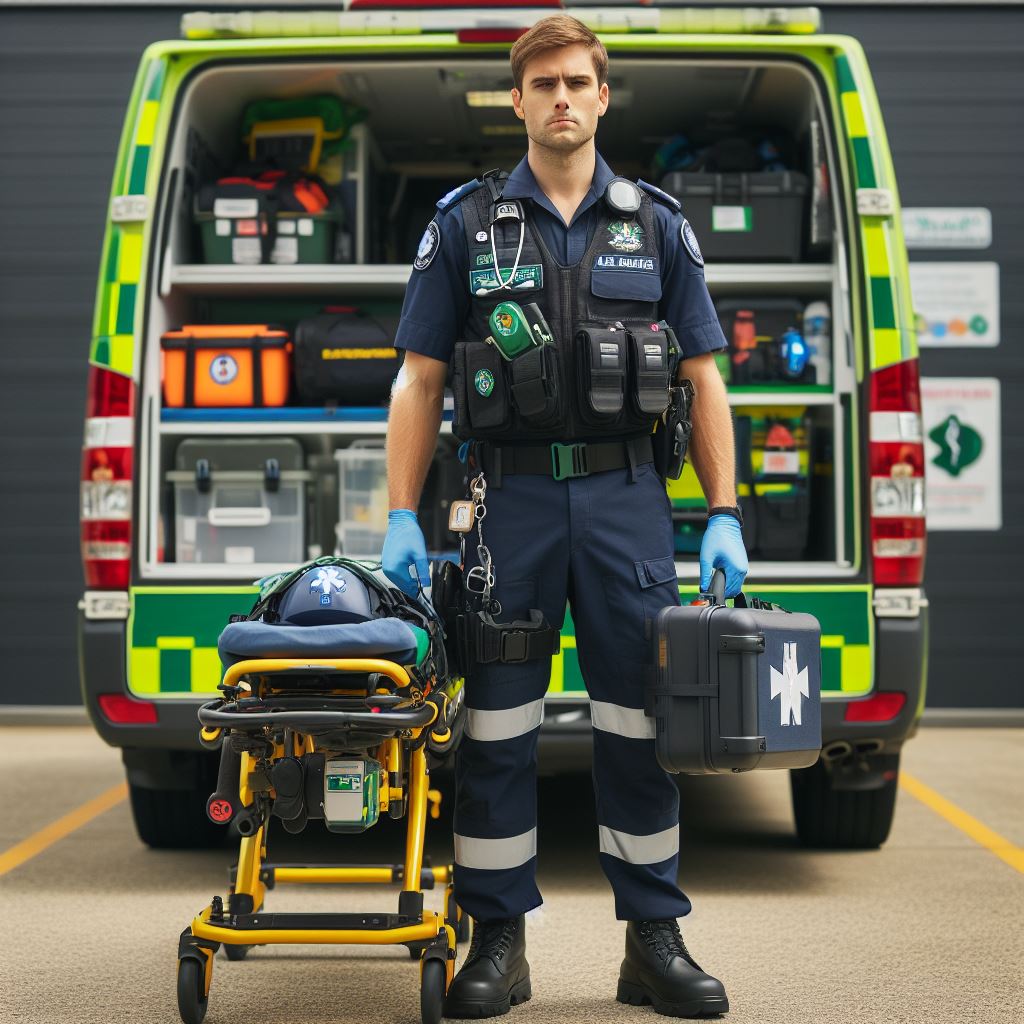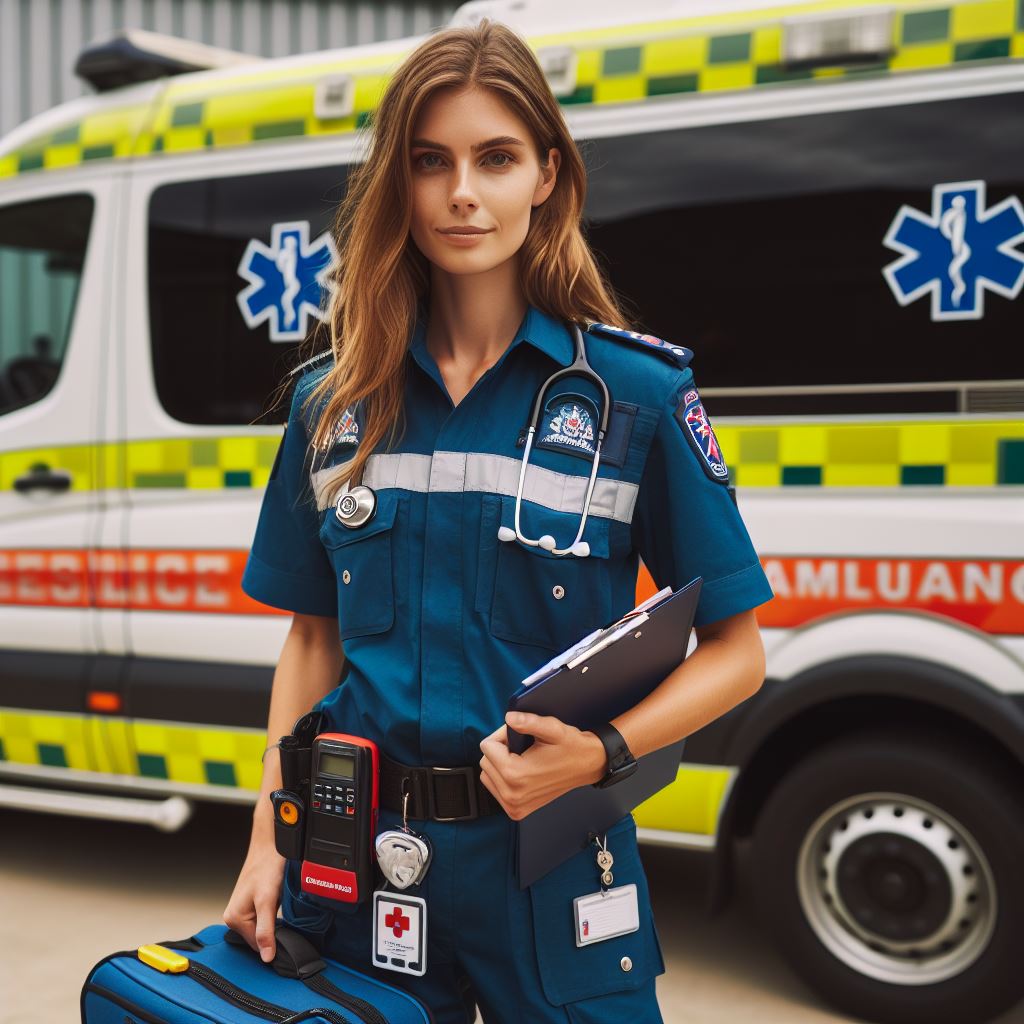Introduction
Paramedic specializations in Australia offer specialized skills that are crucial in the field.
In this blog post, we will explore the importance of these specialized skills and their impact on paramedics’ roles and responsibilities.
Specialized skills are vital in the field of paramedics as they enable professionals to cater to specific needs.
The purpose of this blog post is to shed light on the various paramedic specializations available in Australia and to highlight the significance of these specialized skills in providing effective emergency care.
By gaining expertise in specific areas, paramedics can deliver targeted treatment and improve patient outcomes.
Moreover, specialized skills allow paramedics to handle diverse situations, such as trauma, pediatrics, and mental health emergencies.
These specializations equip professionals with the knowledge and tools necessary to handle complex cases effectively.
One of the prominent paramedic specializations in Australia is aeromedical retrieval, which involves providing medical care in remote and challenging environments.
Other specializations include critical care paramedicine, community paramedicine, and extended care paramedicine.
Each specialization requires additional training and education to develop specialized knowledge and skills.
Through these specialized roles, paramedics can enhance their capabilities and contribute to the healthcare system in a more focused manner.
In review, paramedic specializations in Australia play a crucial role in delivering quality emergency care.
The importance of specialized skills cannot be overstated, as they enable paramedics to provide targeted treatment and handle diverse cases effectively.
Stay tuned to learn more about specific paramedic specializations in upcoming sections of this blog.
Overview of paramedic specializations in Australia
Different areas of specialization available in Australia
- Emergency Medical Response: Paramedics specializing in this field provide immediate medical care during emergency situations.
- Critical Care: These paramedics are trained to handle critical conditions such as cardiac arrest, trauma, and respiratory failure.
- Intensive Care: Specialized paramedics provide advanced life support and critical care interventions during transportation.
- Aeromedical Retrieval: Paramedics in this specialization work in helicopter or airplane services, rescuing and transporting patients in remote areas.
- Tactical Paramedicine: These paramedics provide medical support in high-risk environments such as law enforcement or military operations.
- Neonatal and Pediatric Care: Paramedics with this specialization specialize in providing emergency care to newborns and children.
Variety of settings where paramedics can work
- Ambulance Services: Paramedics are an integral part of ambulance services and respond to emergency calls.
- Hospitals: Paramedics work alongside doctors and nurses in emergency departments and intensive care units.
- Air Medical Services: Paramedics work in helicopters or airplanes, responding to medical emergencies in remote or inaccessible areas.
- Special Events: Paramedics are often present at large-scale events like sports games, concerts, and festivals to provide emergency medical care.
- Remote Areas: Paramedics may be stationed in remote areas where access to medical facilities is limited.
- Industrial Sites: Paramedics work on industrial sites to provide medical support to workers and respond to workplace accidents.
Importance of specialized training
- Enhanced Skills: Specialized training equips paramedics with advanced skills and knowledge specific to their area of specialization.
- Improved Patient Care: Paramedics with specialized training can provide more targeted and specialized care to patients.
- Critical Decision Making: Specialized training prepares paramedics to make critical decisions in high-pressure situations.
- Versatility: Paramedics with specialized training can adapt to different scenarios and provide effective care in various settings.
- Career Advancement: Paramedics with specialized training have more opportunities for career advancement and higher positions.
- Higher Demand: The demand for paramedics with specialized training is increasing, making job prospects favorable.
Basically, paramedic specializations in Australia offer diverse career paths and opportunities for those interested in pre-hospital emergency care.
Specialized training not only improves patient care but also opens doors to various settings and career advancements.
With the increasing demand for specialized paramedics, this field continues to evolve and provide rewarding and vital healthcare services to the Australian community.
Read: Mental Health Support for Doctors in Oz
Your Personalized Career Strategy
Unlock your potential with tailored career consulting. Get clear, actionable steps designed for your success. Start now!
Get StartedSpecializations in emergency and critical care
The role and responsibilities of paramedics specializing in emergency and critical care
Paramedics specializing in emergency and critical care play a crucial role in providing immediate medical assistance to patients in life-threatening situations.
Their responsibilities include assessing the patient’s condition, providing necessary medical interventions, and ensuring their stability during transportation to the hospital.
The additional skills and knowledge required for this specialization
To excel in this specialization, paramedics need to possess advanced skills and knowledge in areas such as advanced cardiac life support, trauma management, and airway management.
They undergo specialized training programs that equip them with the expertise to handle complex emergencies and critical conditions.
These paramedics are proficient in interpreting electrocardiograms, administering medications, and performing advanced procedures like intubation and defibrillation.
They are often involved in situations such as cardiac arrests, severe trauma cases, respiratory distress, and medical emergencies.
This specialization requires paramedics to work effectively under high-pressure situations and make quick and accurate decisions.
They must prioritize patient care, manage multiple tasks simultaneously, and effectively communicate with other healthcare professionals.
Paramedics specializing in emergency and critical care are also trained to respond to mass casualty incidents and disaster situations.
They possess the knowledge to coordinate with other emergency services and provide medical assistance efficiently in such scenarios.
The types of emergencies and critical conditions they handle
Cardiac Emergencies
- Responding to heart attacks and arrhythmias.
- Administering medications to stabilize cardiac conditions.
Trauma and Injury Cases
- Providing advanced trauma life support.
- Managing severe injuries resulting from accidents.
Respiratory Distress
- Administering oxygen therapy.
- Assisting patients with compromised respiratory function.
Neurological Emergencies
- Recognizing and managing strokes.
- Addressing seizures and other neurological crises.
Medical Emergencies
- Responding to diabetic emergencies.
- Managing severe allergic reactions.
Benefits and challenges of specializing in emergency and critical care
Benefits
Choosing to specialize in emergency and critical care offers several benefits for paramedics.
- They gain a deeper understanding of complex medical conditions and how to manage them effectively.
- They have the opportunity to save lives by providing immediate medical interventions.
- They work in a dynamic and fast-paced environment, constantly facing new challenges and learning opportunities.
- Specializing in emergency and critical care also opens up career advancement possibilities, such as becoming a flight paramedic or a paramedic educator.
Challenges
However, this specialization also comes with its challenges.
- Paramedics specializing in emergency and critical care often experience high levels of stress and emotional strain due to the nature of their work.
- They may encounter traumatic situations and witness the suffering of patients, which can affect their mental well-being.
- Working long hours and irregular shifts can also lead to physical exhaustion and work-life imbalance.
- Additionally, the constant exposure to high-stress situations may contribute to burnout among paramedics.
Despite the challenges, paramedics specializing in emergency and critical care continue to make a significant impact on the healthcare system.
Their skills and expertise are invaluable in saving lives and providing immediate medical care to those in dire need.
Stand Out with a Resume That Gets Results
Your career is worth more than a generic template. Let us craft a resume and cover letter that showcase your unique strengths and help you secure that dream job.
Get HiredBy pursuing this specialization, paramedics contribute to the well-being of their communities and make a difference when it matters the most.
Read: How Doctors Navigate Patient Care
Specializations in trauma and injury management
Paramedics specializing in trauma and injury management play a crucial role in emergency healthcare.
With their specialized skills and knowledge, they are responsible for providing immediate medical assistance to patients suffering from traumatic injuries. Here are the key aspects of this specialization:
Role and responsibilities
- These paramedics are trained to assess and manage trauma-related emergencies effectively.
- They follow established protocols to stabilize patients and prevent further complications.
- Paramedics in this specialization are often the first responders at the scene of accidents.
- They aim to provide prompt medical care to trauma victims, with the goal of saving lives.
- These professionals work collaboratively with other healthcare providers, such as doctors and nurses.
Additional skills and knowledge
- Paramedics specializing in trauma and injury management require advanced clinical skills.
- They must be proficient in performing procedures like providing advanced airway management.
- These paramedics are trained in administering medications and intravenous therapy.
- They possess the ability to interpret diagnostic tests and monitor vital signs accurately.
- These professionals are trained in using specialized equipment for trauma management.
Types of trauma situations they handle
- Road Accidents: Paramedics in this specialization play a vital role in attending to road crash victims.
- Industrial Injuries: They are well-equipped to manage traumatic injuries that occur in industrial settings.
- Sports-Related Injuries: Paramedics specializing in trauma and injury management are often present at sporting events.
- Assault and Gunshot Wounds: These paramedics are trained to deal with severe traumatic injuries caused by violence.
- Falls and Accidents at Home: They provide immediate medical assistance in cases of domestic accidents.
Essentially, paramedics specializing in trauma and injury management have an indispensable role in dealing with emergencies.
Their additional skills and knowledge enable them to handle various traumatic situations, ensuring timely and effective medical care for the patients.
It is through their expertise that many lives are saved and individuals receive the critical care they require during such challenging times.
Read: Australian Medical Research Breakthroughs

Specializations in community and aged care
Paramedics specializing in community and aged care play a crucial role in providing medical support and assistance to individuals in these settings.
They have unique responsibilities and require specific skills and knowledge to effectively carry out their duties.
Role and Responsibilities
- Paramedics specializing in community and aged care provide emergency medical care to patients in their homes or aged care facilities.
- They assess the patient’s condition, stabilize their vital signs, and administer necessary treatments or medications.
- These paramedics also communicate with the patient’s family members or caregivers to ensure continuity of care.
- They collaborate with other healthcare professionals, such as doctors and nurses, to develop comprehensive care plans.
- Paramedics in this specialization may also be involved in health promotion and education activities within the community or facility.
Additional Skills and Knowledge
To excel in community and aged care specialization, paramedics need to acquire additional skills and knowledge beyond basic emergency medical training:
- Effective communication skills to engage with patients, their families, and other healthcare team members.
- Empathy and compassion to support patients who may be dealing with physical or mental health challenges.
- Knowledge of age-related conditions, such as dementia or mobility issues, and how to adapt care accordingly.
- Proficiency in administering medications, wound care, and assisting with activities of daily living.
- Understanding of social and cultural factors that influence the health and well-being of older adults.
Situations Handled
Paramedics specializing in community and aged care encounter a range of situations in their daily work:
- Home visits for patients who require medical assistance but are unable to visit a healthcare facility.
- Responding to emergency calls from aged care facilities for falls, respiratory distress, or acute medical conditions.
- Providing palliative care to terminally ill patients in their homes, ensuring pain management and support.
- Assisting with medication management and administration for patients with complex medication regimes.
- Collaborating with social services to address social isolation and promote community engagement for older adults.
Overall, paramedics specializing in community and aged care play a vital role in ensuring the well-being of individuals in these settings.
They possess the necessary skills and knowledge to provide appropriate medical care and support, contributing to the improved quality of life for patients and their families.
Read: Overcoming Challenges in Medical Practice
Specializations in mental health and crisis intervention
Paramedics specializing in mental health and crisis intervention play a critical role in providing emergency medical care and support for individuals experiencing mental health crises.
They are trained to assess and manage these unique situations, ensuring the safety and well-being of patients.
Role and responsibilities
- Responding to emergency calls involving mental health crises and providing immediate medical assistance.
- Evaluating the patient’s mental state and determining the appropriate course of action.
- Offering emotional support and reassurance to patients who may be distressed or agitated.
- Collaborating with mental health professionals, such as psychologists or psychiatrists, to ensure comprehensive care.
- Transporting patients to mental health facilities for further evaluation and treatment, if necessary.
Additional skills and knowledge
Paramedics specializing in mental health and crisis intervention require additional training to effectively handle various situations. These skills include:
- Advanced communication techniques to establish rapport and de-escalate tense situations.
- Understanding of psychiatric medications and their potential interactions or side effects.
- Knowledge of community resources and support networks for ongoing patient care.
- Ability to recognize signs of self-harm or potential harm to others and take appropriate action.
- Training in crisis intervention strategies to address suicidal ideation or psychotic episodes.
Types of mental health crises
Paramedics specializing in mental health and crisis intervention handle a wide range of mental health emergencies. Some common crises include:
- Suicide Attempts or Threats: Paramedics must assess the risk, provide immediate medical care, and ensure the individual’s safety.
- Psychotic Episodes: They assist individuals experiencing hallucinations, delusions, or severe disorientation.
- Acute Anxiety or Panic Attacks: Paramedics help patients manage their symptoms and offer emotional support.
- Substance Abuse-Related Incidents: They provide initial medical assistance and connect individuals with addiction support services.
- Crisis Intervention for Individuals Experiencing Severe Emotional Distress or Mental Breakdowns.
Paramedics specializing in mental health and crisis intervention play a crucial role in promoting the well-being of individuals facing mental health crises.
Their specialized skills and training enable them to provide compassionate and appropriate care, ensuring the best possible outcomes for patients in these challenging situations.
Transform Your LinkedIn for Maximum Impact
Elevate your professional brand with a LinkedIn profile that attracts recruiters, showcases your expertise, and maximizes opportunities. Stand out in your industry with a profile built for success.
Boost ProfileDelve into the Subject: Work-Life Balance in Public Health Jobs
Specializations in Remote and Rural Healthcare
Role and Responsibilities of Paramedics Specializing in Remote and Rural Healthcare
- Paramedics specializing in remote and rural healthcare play a crucial role in providing medical assistance.
- They are responsible for providing immediate and critical care in emergencies.
- These paramedics also act as primary healthcare providers for individuals living in remote areas.
- They conduct patient assessments, administer medications, and perform various medical procedures.
- Paramedics specializing in this field are often involved in community health promotion and education programs.
Additional Skills and Knowledge Required for this Specialization
- Paramedics specializing in remote and rural healthcare need to possess advanced first aid skills.
- They should be proficient in managing trauma patients and stabilizing critical conditions.
- Knowledge of operating in challenging environments with limited resources is essential.
- These paramedics should have expertise in handling medical emergencies in isolated and extreme weather conditions.
- Effective communication skills are vital to collaborate with other healthcare professionals and provide accurate patient information.
Challenges in Providing Healthcare in Remote Areas
- Remote areas often lack healthcare infrastructure, making it difficult for paramedics to access necessary resources.
- Limited transportation options impede the timely transfer of patients to appropriate healthcare facilities.
- Paramedics specializing in remote and rural healthcare may encounter geographical barriers, such as rough terrain or long distances to cover.
- These professionals often face challenges in communication due to poor reception or lack of advanced telecommunication systems.
- Weather conditions in remote areas can be unpredictable and pose risks during patient transfer and emergency response.
Learn More: Cultural Competence in Australian Nursing
Conclusion
Paramedic specializations play a crucial role in Australia’s healthcare system. They ensure that patients receive specialized care tailored to their specific needs, ensuring better outcomes.
The importance of these specializations cannot be overstated, as they contribute to the overall effectiveness and efficiency of emergency medical services.
For readers interested in exploring different paramedic specializations based on their interests and career goals, there are several options available.
They can consider specializing in fields such as pediatric paramedicine, aeromedical retrieval, or intensive care paramedicine.
Each specialization offers unique challenges and opportunities for personal and professional growth.
Explore paramedic specializations by visiting websites of reputable training institutions, government health departments, and professional paramedic organizations for valuable resources.
These platforms often provide information on the various specializations, educational requirements, and job prospects.
In the end, paramedic specializations in Australia are not only essential but also offer exciting avenues for career development.
By specializing in a specific area of paramedic practice, professionals can make a real difference in the lives of patients.
It is crucial for aspiring paramedics to explore the different options available to them and choose a specialization that aligns with their skills, interests, and long-term career goals.
By doing so, they can contribute to the continued improvement of emergency medical services in Australia.




